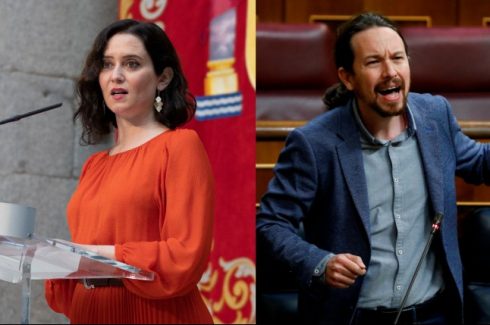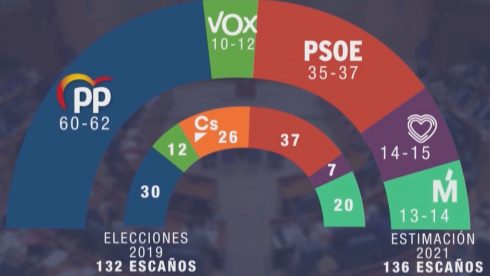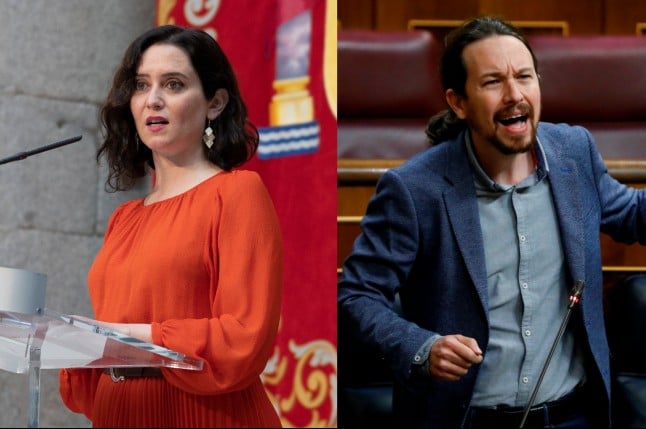They say that a week is a long time in politics… And this week in Spain, that adage runs particularly true.
Spain has seen an intense period of tumultuous political drama that started with a falling out between coalition partners in the southern region of Murcia sparking a series of repercussions that could see a reshaping of the Spanish political scene entirely.
Tensions had been brewing in Murcia where a series of corruption scandals involving the conservative Popular Party (PP) and allegations of jumping the coronavirus vaccination queue led to a rebellion by junior coalition partner, centrist party Ciudadanos.
Ciudadanos, the party that soared in the polls when it went national in 2014 on a market-friendly, anti-corruption platform which sought to wipe out the traditional left-right divide and occupy the centre ground, had allied with the PSOE in an attempt to oust the PP from power in a region where it has ruled for 26 years by calling a no confidence vote.
The attempted coup ultimately failed when on Thursday afternoon the regional chamber, with the support of Vox and three Ciudadanos deputies who rebelled against the party line – and were thrown out of their party – voted in favour of the PP.
But the wrecking ball had already been set in motion and the true battlefield shifted 400 km north to Madrid.
Fearing a similar move in Madrid, where the PP governs with fragile support from Ciudadanos, conservative leader Isabel Ayuso took a gamble; she dissolved the regional government triggering snap elections set for May 4.
But the shockwaves didn’t end there. In a surprise move, the pony-tailed Podemos leader Pablo Iglesias announced on Monday that he would step down from his role in national politics and as Deputy Prime Minister in Pedro Sanchez’s coalition government to lead the challenge of the Left in Madrid.
This is the party that grew out of the indignado movement in the wake of Spain’s economic to become a dazzling new force in Spain dedicated to tackling corruption and fighting austerity only to lose support as it became more entrinched in the establishment.
With the battle lines drawn for an ideologically charged fight for the capital, Ayuso introduced the slogan “Communism or Liberty”.

The move has set Madrid for a clash against the polarised forces of Left and Right sending Ciudadanos plummeting towards electoral oblivion and driving the PP further into the arms of the far-right Vox to have any hope of maintaining power in the region.
“If I have to make a pact, I have no problem with Vox,” said Ayuso, who has forged a reputation as a maverick defying the leftist central government and health authorities by keeping bars and shops open during the COVID-19 pandemic.
Such a pact will be uncomfortable for Pablo Casado, national head of the party and leader of opposition, who has made efforts to present a more moderate face and distance the party from the extreme views of Vox.
Meanwhile the Socialists will launch their own bid for Madrid, where they came first in the previous elections but failed to find support to pull together a government.
The repercussions don’t end with Madrid as Ciudadanos waning power could have significance in both Andalucia and Castilla-León where they are in coalition with the PP to rule.
The governments’ in both regions have so far insisted the pacts remain valid.
In fact, the Popular Party and Ciudadanos strengthened their commitment to the coalition in Andalucia, where they joined forces in 2018 to end almost 37 years of uninterrupted rule by the Socialists, by signing a five-point agreement not to waver from the pact.
But back in Madrid, the far-left itself is fractured. On Tuesday, Más Madrid – a breakaway group led by Iglesias’ former wingman Iñigo Errejon – refused the offer to join forces with Podemos and run together on a joint far left list.
For any fans of Monty Python’s Life of Brian the situation is laughably familiar but ultimately depressing for those who fear Ayuso is unstoppable.
“Are you the Judeans People Front?” asks Brian. “F**K off! We’re the People’s Front of Judea.”
What the polls say

The latest opinion poll by GAD3 currently predicts a win for Isabel Ayuso and the conservative People’s Party (PP) with over 40% support among likely voters, about double the result in the previous election in May 2019. This would win them between 60-62 seats but still falls short of the 69 seats needed to form a majority government.
This is well ahead of Spain’s main ruling Socialist Party which scores 24% of voter share or between 35 and 37 seats down from 27% at the last election.
Vox looks set to win 7.9% of the vote (between 10 and 12 seats) a slight drop from the 8.9% in 2019.
Ciudadanos look set for electoral oblivion scoring only 1.9% support of potential voters a whopping drop from 19.4% share and 26 seats it won in the last election. This is below the 5% share needed to secure a presence in the regional parliament.
Mas Madrid drops 9.2% (13-14 seats) from the 14.6% (20 seats) it won in 2019 while Podemos looks set to double its share of support from 5% to 10.9% (winning 14.15 seats).
If results fall along these lines then the likely result would be a PP government with the support of Vox as a leftist group involving PSOE, Podemos and Mas Madrid still wouldn’t reach 50 percent of the seats.
READ ALSO:
- Podemos leader steps down as Spain’s deputy pm to fight battle for Madrid
- Madrid shock: Regional leader Isabel Diaz Ayuso triggers snap election with resignation
- Partido Popular could be ousted from controlling Spain’s Murcia region for the first time since mid-nineties
Click here to read more Madrid News from The Olive Press.








